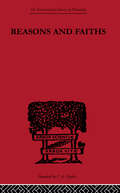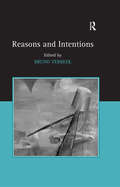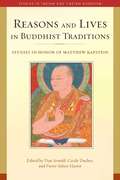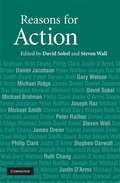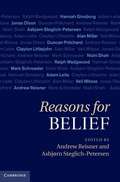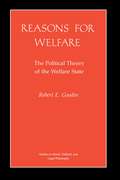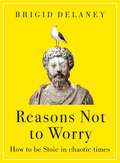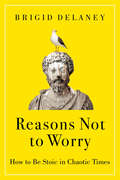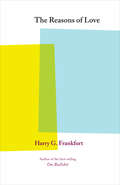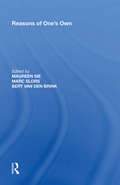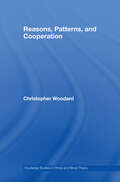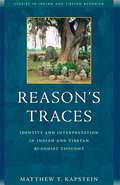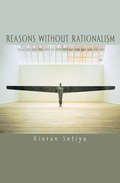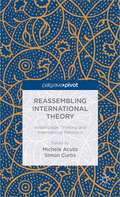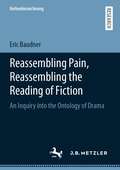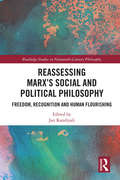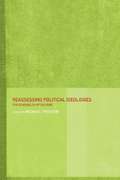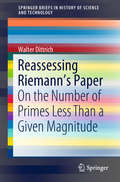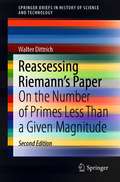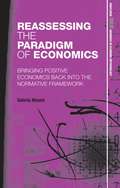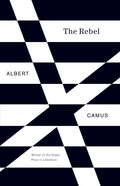- Table View
- List View
Reasons and Faiths (International Library of Philosophy)
by Ninian SmartFirst published in 2000. Routledge is an imprint of Taylor & Francis, an informa company.
Reasons and Intentions
by Bruno VerbeekThere are a number of problems in philosophy that seem to share a similar possible solution: 'Why do promises and contracts bind?', 'Why ought citizens and judges obey the law?' and 'Can we realize the gains to be made from cooperation?'. All three problems (as well as some others) share a possible solution in the form of rational internal commitment. Reasons and Intentions is a 'state-of-the-art' overview of the relevant positions on the possibility of such commitment, including critical ones. The introduction provides a survey of the central problem of the volume, 'how the will can bind itself and still be instrumental in nature', and the various positions which are further examined in the contributions. Addressing the question of the relation between intentions and action, the considerations which make an intention rational and how this translates into our conception of (moral) agency, this book brings together specially commissioned essays by the leading scholars in the field.
Reasons and Intentions in Law and Practical Agency
by George Pavlakos Veronica Rodriguez-BlancoThis collection of new essays explores in depth how and why we act when we follow practical standards, particularly in connection with the authority of legal texts and lawmakers. The essays focus on the interplay of intentions and practical reasons, engaging incisive arguments to demonstrate both the close connection between them, and the inadequacy of accounts that downplay this important link. Their wide-ranging discussion includes topics such as legal interpretation, the paradox of intention, the relation between moral and legal obligation, and legal realism. The volume will appeal to scholars and students of legal philosophy, moral philosophy, law, social science, cognitive psychology, and philosophy of action.
Reasons and Lives in Buddhist Traditions: Studies in Honor of Matthew Kapstein (Studies in Indian and Tibetan Buddhism)
by Dan ArnoldThe celebrated career of a venerated scholar inspires incisive new contributions to the field of Indian and Tibetan Buddhism.Particularly known for his groundbreaking and influential work in Tibetan studies, Matthew Kapstein is a true polymath in Buddhist and Asian studies more generally; possessing unsurpassed knowledge of Tibetan culture and civilization, he is also deeply grounded in Sanskrit and Indology, and his highly accomplished work in these cultural and civilizational areas has exemplified a whole range of disciplinary perspectives. Reflecting something of the astonishing range of Matthew Kapstein&’s work and interests, this collection of essays pays tribute to a luminary in the field by exemplifying some of the diverse work in Buddhist and Asian studies that has been impacted by his scholarship and teaching. Engaging matters as diverse as the legal foundations of Tibetan religious thought, the teaching careers of modern Chinese Buddhists, the history of Bhutan, and the hermeneutical insights of Vasubandhu, these essays by students and colleagues of Matthew Kapstein are offered as testament to a singular scholar and teacher whose wide-ranging work is unified by a rare intellectual selflessness.
Reasons and Persons
by Derek Parfit"Very few works in the subject can compare with Parfit's in scope, fertility, imaginative resource, and cogency of reasoning. "--P. F. Strawson, The New York Review of Books. "Extraordinary. . . Brilliant. . . Astonishingly rich in ideas. . . Reasons and Persons is a major contribution to philosophy: it will be read, honoured, and argued about for many years to come. "--Samuel Scheffler, Times Literary Supplement. "A brilliantly clever and imaginative book. . . Strange and excitingly intense. "--Alan Ryan, Sunday Times (London). "Not many books reset the philosophical agenda in the way that his one does. . . Western philosophy, especially systematic ethics, will not be the same again. "--Annette Baier, Philosophical Books. Challenging, with several powerful arguments, some of our deepest beliefs about rationality, morality, and personal identity, Parfit claims that we have a false view about our own nature. It is often rational to act against our own best interests, he argues, and most of us have moral views that are self-defeating. We often act wrongly, although we know there will be no one with serious grounds for complaint, and when we consider future generations it is very hard to avoid conclusions that most of us will find very disturbing.
Reasons for Action
by Steven Wall David SobelWhat are our reasons for acting? Morality purports to give us these reasons, and so do norms of prudence and the laws of society. The theory of practical reason assesses the authority of these potentially competing claims, and for this reason philosophers with a wide range of interests have converged on the topic of reasons for action. This volume contains eleven essays on practical reason by leading and emerging philosophers. Topics include the differences between practical and theoretical rationality, practical conditionals and the wide-scope ought, the explanation of action, the sources of reasons, and the relationship between morality and reasons for action. The volume will be essential reading for all philosophers interested in ethics and practical reason.
Reasons for Belief
by Andrew Reisner Asbjørn Steglich-PetersenPhilosophers have long been concerned about what we know and how we know it. Increasingly, however, a related question has gained prominence in philosophical discussion: what should we believe and why? This volume brings together twelve new essays that address different aspects of this question. The essays examine foundational questions about reasons for belief, and use new research on reasons for belief to address traditional epistemological concerns such as knowledge, justification and perceptually acquired beliefs. This book will be of interest to philosophers working on epistemology, theoretical reason, rationality, perception and ethics. It will also be of interest to cognitive scientists and psychologists who wish to gain deeper insight into normative questions about belief and knowledge.
Reasons for Welfare: The Political Theory of the Welfare State (Studies in Moral, Political, and Legal Philosophy #4)
by Robert E. GoodinRobert Goodin passionately and cogently defends the welfare state from current attacks by the New Right. But he contends that the welfare state finds false friends in those on the Old Left who would justify it as a hesitant first step toward some larger, ideally just form of society. Reasons for Welfare, in contrast, offers a defense of the minimal welfare state substantially independent of any such broader commitments, and at the same time better able to withstand challenges from the New Right's moralistic political economy. This defense of the existence of the welfare state is discussed, flanked by criticism of Old Left and New Right arguments that is both acute and devastating. In the author's view, the welfare state is best justified as a device for protecting needy--and hence vulnerable--members of society against the risk of exploitation by those possessing discretionary control over resources that they require. Its task is to protect the interests of those not in a position to protect themselves. Communitarian or egalitarian ideals may lead us to move beyond the welfare state as thus conceived and justified. Moving beyond it, however, does not invalidate the arguments for constantly maintaining at least the minimal protections necessary for vulnerable members of society.
Reasons Not to Worry: How to be Stoic in chaotic times
by Brigid DelaneyWe're all searching for answers to the biggest questions. How to be good? How to find calm? How to properly grieve? How to beat FOMO? How to work out what truly matters? Well, good news is that the wisest minds in history asked the exact same questions - and they found answers. Their ancient philosophy of Stoicism can show us that we today are in fact already in possession of the very tools we need to excavate this much-needed wisdom for ourselves. So into the past we go with Brigid Delaney, to a time not unlike our own: one full of pandemonium, war, plagues, pestilence, treachery, corruption, anxiety, overindulgence and, even then, the fear of a climate apocalypse. By learning and living the teachings of three ancient guides, Epictetus, Seneca and Marcus Aurelius, Brigid shows us how we can apply these lessons to our modern lives in a way that allows us to regain a sense of agency and tranquillity. Stoicism can be tough medicine to swallow, but not here-this book is awash with insight, humour and compassion. Timely and so very useful, and filled to the brim with ways you can wrest back control, here are all the reasons not to worry.
Reasons Not to Worry: How to Be Stoic in Chaotic Times
by Brigid DelaneyIn this heartfelt and soul-searching work, brimming with warmth, humor, and insight, the beloved Guardian columnist spends a year exploring how to pursue a rich and meaningful life, turning to the wisdom of the Stoics for insights into the deepest questions of existence. Like many people today, Brigid Delaney was searching for answers to timeless questions: How can we be good? Find inner peace? Properly grieve? Tame our insecurities, such as the fear of missing out? Determine what truly matters?Centuries ago, the Stoics pondered many of these same questions. And so, at an important inflection point in her own life, Brigid decided to let these ancient philosophers be her guide. Brigid is rash where the Stoics are logical; she runs on chaos, while the Stoics relinquish control of things beyond their reach. Over the course of a year, she dedicated herself to following the wisdom of Seneca, Epictetus, and Marcus Aurelius. She hoped to discover how best to live—how she could use the wisdom of these ancient thinkers to navigate life in the modern world.In Reasons Not to Worry, Brigid shares what she learned, showing us how we, too, can draw on the Stoics to regain a sense of agency and tranquility and find meaning in our lives. From learning to relinquish control to cultivating daily awareness of our mortality to building community, Brigid’s insights are very funny and very wise.Stoicism can be a tough medicine to swallow, but no longer. Thoughtful, timely, surprisingly practical, and filled to the brim with ways to learn how best to be in the world, Delaney’s guide provides compelling and sensible reasons not to worry.
The Reasons of Love
by Harry G. FrankfurtFrom the author of the #1 New York Times bestseller On Bullshit, a profound meditation on how and why we loveIn The Reasons of Love, leading moral philosopher and bestselling author Harry Frankfurt argues that the key to a fulfilled life is to pursue wholeheartedly what one cares about, that love is the most authoritative form of caring, and that the purest form of love is, in a complicated way, self-love. Through caring, we infuse the world with meaning. Caring provides us with stable ambitions and concerns, and it shapes the framework of aims and interests within which we lead our lives. Love is a nonvoluntary, disinterested concern for the flourishing of what we love—and self-love, as distinct from self-indulgence, is at heart of this concern. The most elementary form of self-love is no more than the desire to love, and self-love is simply a commitment to finding meaning in our lives.
Reasons of One's Own
by Marc SlorsPractical reasoning in contemporary Western societies is characterised by an unprecedented degree of idiosyncrasy and demands of personal authenticity. This has resulted from the decline of traditional moral authorities, the rise of individualistic lifestyles, increasing multiculturalism and rapid technological advance. These developments have given rise to reflection on the notion of 'reasons of one's own', an examination of the intelligibility of reasons that are closely connected to a particular agent, and recognised as such by others, although not shared by them. Problems addressed by the contributors include; How to account for the cognitive overtones in moral and motivational language given the apparent 'agent-relativity' of reasons. How to retain the 'agent-relativity' of reasons for action given that they require articulation through a language shared by the community, and how to account for the practical rationality required for co-operation between persons in view of the idiosyncrasy of a person's motivating reasons. In dealing with these issues this book presents a range of investigative essays on the concept of reasons of one's own by leading authors from all relevant philosophical areas of expertise.
Reasons, Patterns, and Cooperation (Routledge Studies in Ethics and Moral Theory)
by Christopher WoodardThis book is about fundamental questions in normative ethics. It begins with the idea that we often respond to ethical theories according to how principled or pragmatic they are. It clarifies this contrast and then uses it to shed light on old debates in ethics, such as debates about the rival merits of consequentialist and deontological views. Using the idea that principled views seem most appealing in dilemmas of acquiescence, it goes on to develop a novel theory of pattern-based reasons. These are reasons to play one’s part in some larger pattern of action because of the goodness or rightness of that pattern. Existing accounts of pattern-based reasons usually assume that such reasons can exist only in cooperative contexts. This book rejects that assumption, and claims instead that we can have pattern-based reasons even when the other agents involved in the pattern are wholly unwilling to cooperate. The result is a pluralist teleological structure for ethics, with similarities to some forms of Rule Consequentialism. Woodard claims that this structure achieves an attractive balance between the two virtues of being pragmatic and being principled.
Reasons, Rights, and Values
by Robert AudiA central concern in recent ethical thinking is reasons for action and their relation to obligations, rights, and values. This collection of recent essays by Robert Audi presents an account of what reasons for action are, how they are related to obligation and rights, and how they figure in virtuous conduct. In addition, Audi reflects in his opening essay on his theory of reasons for action, his common-sense intuitionism, and his widely debated principles for balancing religion and politics. Reasons are shown to be basic elements in motivation, grounded in experience, and crucial for justifying actions and for understanding rights. Audi's clear and engaging essays make these advanced debates accessible to students as well as scholars, and this volume will be a valuable resource for readers interested in ethical theory, political theory, applied ethics, or philosophy of action.
Reason's Traces
by Matthew KapsteinReason's Traces addresses some of the key questions in the study of Indian and Buddhist thought: the analysis of personal identity and of ultimate reality, the interpretation of Tantric texts and traditions, and Tibetan approaches to the interpretation of Indian sources. Drawing on a wide range of scholarship, Reason's Traces reflects current work in philosophical analysis and hermeneutics, inviting readers to explore in a Buddhist context the relationship between philosophy and traditions of spiritual exercise.
Reasons without Rationalism
by Kieran SetiyaModern philosophy has been vexed by the question "Why should I be moral?" and by doubts about the rational authority of moral virtue. In Reasons without Rationalism, Kieran Setiya shows that these doubts rest on a mistake. The "should" of practical reason cannot be understood apart from the virtues of character, including such moral virtues as justice and benevolence, and the considerations to which the virtues make one sensitive thereby count as reasons to act. Proposing a new framework for debates about practical reason, Setiya argues that the only alternative to this "virtue theory" is a form of ethical rationalism in which reasons derive from the nature of intentional action. Despite its recent popularity, however, ethical rationalism is false. It wrongly assumes that we act "under the guise of the good," or it relies on dubious views about intention and motivation. It follows from the failure of rationalism that the virtue theory is true: we cannot be fully good without the perfection of practical reason, or have that perfection without being good. Addressing such topics as the psychology of virtue and the explanation of action, Reasons without Rationalism is essential reading for philosophers interested in ethics, rationality, or the philosophy of mind.
Reassembling International Theory: Assemblage Thinking and International Relations
by Michele Acuto Simon CurtisWhat can 'assemblage' thinking contribute to the study of international relations theory? This study seeks to investigate how the various debates on assemblages in social theory can contribute to generating critical considerations on the connections and dissociation of political agency, physical world and international dynamics.
Reassembling Pain, Reassembling the Reading of Fiction: An Inquiry into the Ontology of Drama
by Eric BaudnerThe present book deals with Sarah Kane’s dramatic text Cleansed to show a specific negotiation of violence, pain, life and death – one that is not necessarily causal or dichotomous. Instead, a new mode of reading, based on Bruno Latour’s take on Actor-Network-Theory, helps to make fictional worlds simultaneously intelligible in a mediate and in an immediate way. This results in an unprecedented understanding of how language can influence and modify ontological configurations. Eventually, this allows for a re-evaluation of political problems that occur in the 20th and 21st century.
Reassessing Marx’s Social and Political Philosophy: Freedom, Recognition, and Human Flourishing (Routledge Studies in Nineteenth-Century Philosophy)
by Jan KandiyaliInterest in the study of Marx’s thought has shown a revival in recent years, with a number of newly established academic societies, conferences, and journals dedicated to discussing his thought. This book brings together distinguished and up-and-coming scholars to provide a major re-evaluation of historical issues in Marx scholarship and to connect Marx’s ideas with fresh debates in contemporary Anglo-American social and political philosophy. Among the topics discussed are Marx’s relationship to his philosophical predecessors—including Hegel, the young Hegelians, and the utopian socialists—his concept of recognition, his critique of liberalism, and his views on the good life. This book will be of interest to scholars and advanced students interested in Marx, Hegel, the history of political thought, and social and political philosophy.
Reassessing Political Ideologies: The Durability of Dissent
by Michael FreedenThis book is a high-level examination of each of the major ideologies that have shaped political thinking, action and conflict. Each chapter provides a critical overview of the current state of the major ideologies and a retrospective assessment of the strengths, weaknesses, developments and transformations of these ideologies over the past century.The volume poses a strong challenge to those who have loudly proclaimed the "end of ideology", by demonstrating that it is impossible to understand current political developments without an appreciation of their ideological context. It features internationally respected contributors who are authorities in their fields, and will be an invaluable resource for both students and specialists in areas including Politics and International Relations.
Reassessing Riemann's Paper: On The Number Of Primes Less Than A Given Magnitude (Springerbriefs In History Of Science And Technology Ser.)
by Walter DittrichIn this book, the author pays tribute to Bernhard Riemann (1826–1866), mathematician with revolutionary ideas, whose work on the theory of integration, the Fourier transform, the hypergeometric differential equation, etc. contributed immensely to mathematical physics. This book concentrates in particular on Riemann’s only work on prime numbers, including such then new ideas as analytical continuation in the complex plane and the product formula for entire functions. A detailed analysis of the zeros of the Riemann zeta function is presented. The impact of Riemann’s ideas on regularizing infinite values in field theory is also emphasized.
Reassessing Riemann's Paper: On the Number of Primes Less Than a Given Magnitude (SpringerBriefs in History of Science and Technology)
by Walter DittrichIn this book, the author pays tribute to Bernhard Riemann (1826-1866), a mathematician with revolutionary ideas, whose work on the theory of integration, the Fourier transform, the hypergeometric differential equation, etc. contributed immensely to mathematical physics. The text concentrates in particular on Riemann’s only work on prime numbers, including ideas – new at the time – such as analytical continuation into the complex plane and the product formula for entire functions. A detailed analysis of the zeros of the Riemann zeta-function is presented. The impact of Riemann’s ideas on regularizing infinite values in field theory is also emphasized. This revised and enhanced new edition contains three new chapters, two on the application of Riemann’s zeta-function regularization to obtain the partition function of a Bose (Fermi) oscillator and one on the zeta-function regularization in quantum electrodynamics. Appendix A2 has been re-written to make the calculations more transparent. A summary of Euler-Riemann formulae completes the book.
Reassessing the Paradigm of Economics: Bringing Positive Economics Back into the Normative Framework (Routledge Inem Advances In Economic Methodology Ser. #12)
by Valeria MosiniWhen President Reagan and Prime Minister Thatcher adopted the neoliberal doctrine as the paradigm of economics, there was no evidence that the move would have been successful, but thirty years on, the recurrent crises that culminated in 2008 suggest a serious mis-match between expectations and outcomes: a re-examination of the paradigm is in order. This book focuses on Milton Friedman’s formulation of the neoliberal doctrine, and analyses two aspects that were essential to turning it into a fully-fledged paradigm: the attribution of scientific status to positive economics, which led to informing public policies on the requirements of the market; and the characterisation of economic freedom as capable of promoting political freedom, which led to identifying free market with democracy. The book exposes Friedman’s methodological argument for attributing positive economics scientific status as a failure, and his characterisation of economic freedom as a delusion; it identifies in the emergence as the mainstream in economics of the neoclassical synthesis, which borrowed from Walras’ the mathematical treatment of equilibrium but not the ethical and social framework in which it was inscribed, a development that facilitated the transition from the Keynesian to the neoliberal paradigm. Dr. Mosini shows that the gigantic bail-outs carried out courtesy of the public purse, which institutionalised the practice of collectivising losses while keeping profits private, were no accident, but the consequence of the rethinking of the function of lender of last resort according to Friedman’s conception of rationality in relation to risk, combined with his interpretation of the 1930s recession. The book concludes that the neoliberal paradigm has served the interests of the economically powerful social strata it was designed to benefit extremely well, but that the deep, and deepening, injustice it has brought about calls for a complete rethinking of the paradigm of economics according to ethical principles respectful of human values. This book should be of interest to students and researchers of Political Economy, Economic Methodology, History of Economic Thought and Philosophy.
The Rebel
by Albert CamusBy one of the most profoundly influential thinkers of our century, The Rebel is a classic essay on revolution. For Albert Camus, the urge to revolt is one of the "essential dimensions" of human nature, manifested in man's timeless Promethean struggle against the conditions of his existence, as well as the popular uprisings against established orders throughout history. And yet, with an eye toward the French Revolution and its regicides and deicides, he shows how inevitably the course of revolution leads to tyranny. As old regimes throughout the world collapse, The Rebel resonates as an ardent, eloquent, and supremely rational voice of conscience for our tumultuous times.Translated from the French by Anthony Bower.
Rebel Governance in Civil War
by Arjona, Ana and Kasfir, Nelson and Mampilly, Zachariah Ana Arjona Nelson Kasfir Zachariah MampillyThis is the first book to examine and compare how rebels govern civilians during civil wars in Latin America, Africa, Asia, and Europe. Drawing from a variety of disciplinary traditions, including political science, sociology, and anthropology, the book provides in-depth case studies of specific conflicts as well as comparative studies of multiple conflicts. Among other themes, the book examines why and how some rebels establish both structures and practices of rule, the role of ideology, cultural, and material factors affecting rebel governance strategies, the impact of governance on the rebel/civilian relationship, civilian responses to rebel rule, the comparison between modes of state and non-state governance to rebel attempts to establish political order, the political economy of rebel governance, and the decline and demise of rebel governance attempts.
